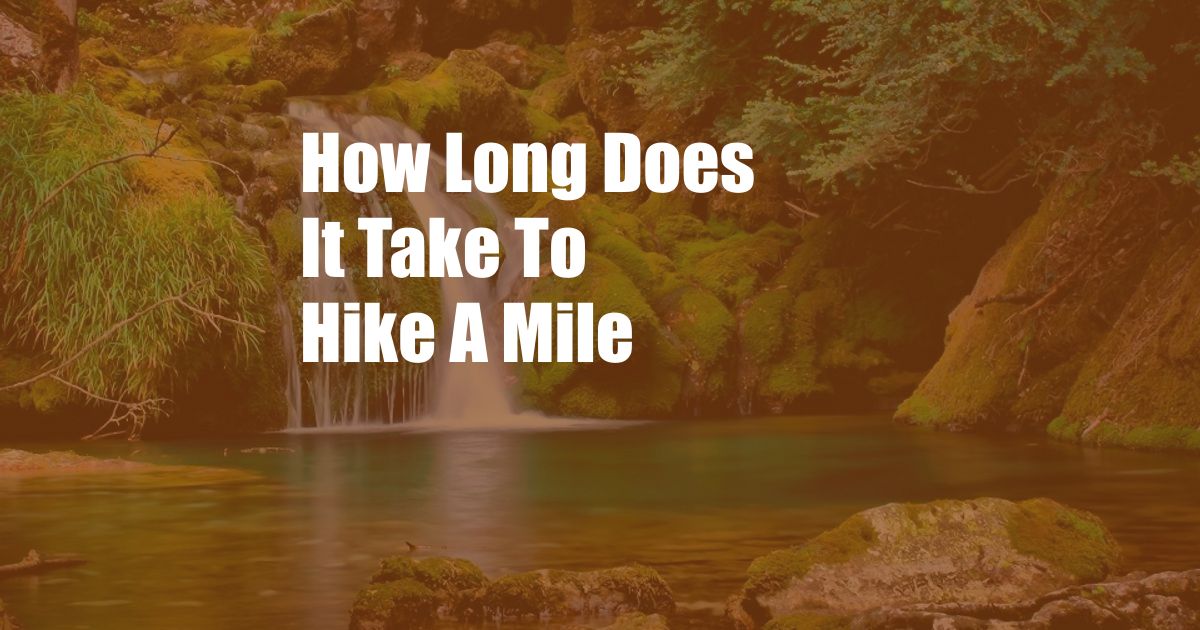
How Long Does it Take to Hike a Mile?
Have you ever wondered how long it would take you to hike a mile? Whether you’re an experienced hiker or just starting out, this is a common question that can help you plan your hikes. In this article, we’ll explore the factors that affect hiking speed and provide tips for estimating how long it will take you to hike a mile. We’ll also look at some of the latest trends in hiking and offer some expert advice to help you make the most of your hiking experience.
Factors that Affect Hiking Speed
The speed at which you hike depends on a number of factors, including the following:
Terrain: The terrain you’re hiking on can have a big impact on your speed. Hiking on flat, even ground is much faster than hiking on steep, rocky terrain.
Elevation gain: If you’re hiking uphill, you’ll be slower than if you’re hiking on flat ground. The amount of elevation gain you’re hiking can also affect your speed.
Pack weight: The weight of your pack can also slow you down. If you’re carrying a heavy pack, you’ll be slower than if you’re carrying a light pack.
Fitness level: Your fitness level will also affect your hiking speed. If you’re in good shape, you’ll be able to hike faster than if you’re not in shape.
Estimating How Long it Will Take to Hike a Mile
Once you’ve considered the factors that affect hiking speed, you can start to estimate how long it will take you to hike a mile. A good rule of thumb is to allow for 20-30 minutes per mile on flat, even ground. If you’re hiking on more challenging terrain, you’ll need to allow for more time.
Tips for Estimating Hiking Time
Here are a few tips for estimating how long it will take you to hike a mile:
Use a hiking map: A hiking map will show you the distance and elevation gain of your hike. This information can help you estimate how long it will take you to complete your hike.
Talk to a ranger: If you’re hiking in a national park or other public land, you can talk to a ranger about the difficulty of the hike and how long it will take to complete.
Start early: If you’re hiking a long distance, it’s a good idea to start early. This will give you plenty of time to complete your hike before dark.
Take breaks: It’s important to take breaks throughout your hike, especially if you’re hiking on challenging terrain. This will help you avoid getting tired and injured.
Latest Trends in Hiking
Hiking is becoming increasingly popular, and there are a number of new trends that are emerging in the hiking community. Here are a few of the latest trends:
Backpacking: Backpacking is a great way to experience the wilderness. Backpackers carry all of their gear on their backs, which allows them to hike to remote areas that are not accessible by car.
Trail running: Trail running is a great way to get a workout and enjoy the outdoors. Trail runners run on trails, which can be more challenging than running on roads.
Geocaching: Geocaching is a fun way to explore the outdoors. Geocachers use GPS devices to find hidden containers, or “caches,” that are placed in various locations.
Expert Advice for Hikers
Here are a few expert tips for hikers:
Choose the right gear: The right gear can make a big difference in your hiking experience. Make sure you have the right boots, clothing, and pack for your hike.
Train for your hike: If you’re planning on hiking a long distance, it’s important to train for your hike. This will help you avoid getting tired and injured.
Be prepared for the weather: The weather can change quickly in the mountains, so it’s important to be prepared for all types of weather conditions.
Leave no trace: When you’re hiking, it’s important to leave no trace of your visit. This means packing out all of your trash and respecting the natural environment.
Frequently Asked Questions about Hiking
Here are a few frequently asked questions about hiking:
Q: What is the average hiking speed?
A: The average hiking speed is 2-3 miles per hour.
Q: How many calories do you burn hiking?
A: You burn about 500 calories per hour of hiking.
Q: What should I wear hiking?
A: You should wear comfortable, breathable clothing that is appropriate for the weather conditions.
Q: What should I bring on a hike?
A: You should bring plenty of water, snacks, a map, a compass, and a first-aid kit.
Conclusion
Hiking is a great way to get exercise, enjoy the outdoors, and explore the wilderness. By following these tips, you can make sure that your hiking experience is safe and enjoyable.
Would you like to learn more about hiking? If so, there are a number of resources available online and in libraries. You can also find hiking clubs and groups in most communities.